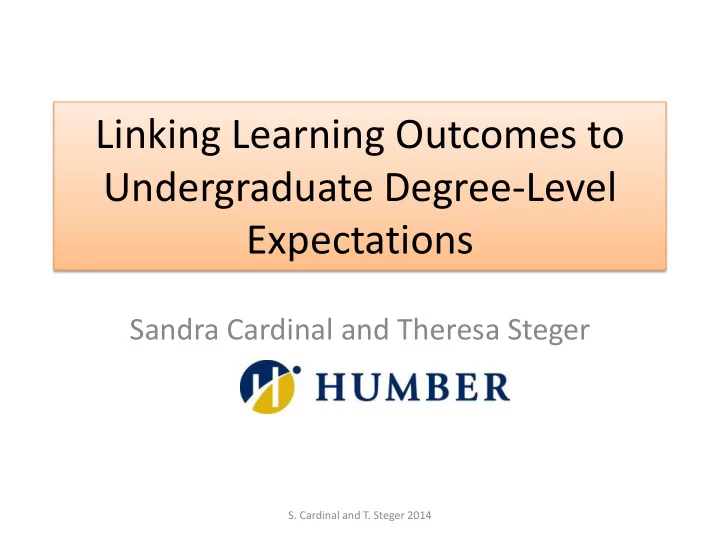

Linking Learning Outcomes to Undergraduate Degree-Level Expectations Sandra Cardinal and Theresa Steger S. Cardinal and T. Steger 2014
Learning Outcomes for this Session Participants will: 1. Discuss the range of applications of outcomes- based learning models across educational uses. 2. Identify the limitations and challenges inherent in the outcomes-based model. 3. Sort learning outcome statements to align with categories of learning. 4. Apply OQF to assess and improve learning outcome statements. S. Cardinal and T. Steger 2014
Outcomes-based Learning • Focuses on learners: Describes the results of learning rather than the inputs of teaching • Encourages focus on higher-order cognitive, psychomotor or affective objectives • Has been adopted for a range of applications across educational jurisdictions and purposes. • Fitzgibbon, J. (2014) Toronto: Speaking at ONCAT Conference on behalf of BCCAT) S. Cardinal and T. Steger 2014
Quality Assurance & Improvement • Accreditation • Credential recognition • Demonstration of learning • Program evaluation & improvement • Certification of graduates • Program description against qualifications framework S. Cardinal and T. Steger 2014
Improvement in Teaching and Learning • Sequencing, preparation and progress • Reducing curriculum overlaps • Aligning courses to program standards • Supporting pathway success • Describing quality • Communicating achievement (students, faculty, approval/accreditation bodies) S. Cardinal and T. Steger 2014
Credit Accumulation and Transfer • Providing a common reference point • Establishing equivalency • Assessing quality • Describing results / outputs • Facilitating connections in higher education – pathways, professional learning, credential progression S. Cardinal and T. Steger 2014
Recognized Issues in Outcomes-Based Model • Faculty in some disciplines may resist pre-determined learning • May be criticized as limiting academic freedom or eroding trust in professional knowledge and judgment • May encourage teaching and learning to a minimum standard • Transparency for students may give a simplistic view of learning and formulaic approaches • May devalue responsiveness to individual student learning goals • May limit potential for recognition of unanticipated learning S. Cardinal and T. Steger 2014
OQF Framework 1. Depth and Breadth of Knowledge 2. Knowledge of Methodologies 3. Application of Knowledge 4. Communication Skills 5. Awareness of the Limits of Knowledge 6. Professional Capacity / Autonomy S. Cardinal and T. Steger 2014
Sorting Exercise Sort the program learning outcomes in your envelope based on OQF Categories of learning. S. Cardinal and T. Steger 2014
Questions • Are any OQF categories left unaddressed or under- addressed ? • A re any CLO’s ambiguous – seeming to fit into more than one category? • Are there outcomes that are difficult to measure? S. Cardinal and T. Steger 2014
Depth and Breadth of Knowledge- Examples • Terminology • Taxonomies • Definitions • Historical aspects • Identification of Theoretical frameworks • Key figures and contributions to the field • Socio-political factors affecting issues S. Cardinal and T. Steger 2014
Knowledge of Methodologies- Examples • Using equipment • Employing system or framework • Research methods • Using formulae S. Cardinal and T. Steger 2014
Application of Knowledge- • Analyzing issues • Synthesizing information • Creating a product • Applying a theoretical construct • Adapting a concept • Solving complex problems • Critiquing arguments S. Cardinal and T. Steger 2014
Communication Skills- Examples • Reading, writing, listening, speaking • Presenting • Demonstrating visual literacy • Instructing, coaching • Contributing • Critiquing S. Cardinal and T. Steger 2014
Awareness of the Limits of Knowledge – Examples • Self-assessing, reflecting • Recognizing the limits of theoretical explanatory powers • Defining and applying scope of practice • Seeking lifelong learning opportunities S. Cardinal and T. Steger 2014
Professional Capacity/Autonomy – Examples • Cooperating and collaborating • Showing initiative • Integrating diverse opinions • Respecting cultural differences • Acting ethically • Managing time effectively • Creating a professional portfolio S. Cardinal and T. Steger 2014
Why Align Learning Outcomes with Ontario Qualification Framework? • To demonstrate degree level standards at course and program level • To ensure all areas of scholarship addressed • To keep the number of learning outcomes to a manageable number, avoiding duplication within program • To develop logical progression of skills and knowledge in courses and programs S. Cardinal and T. Steger 2014
Why Align Learning Outcomes with Ontario Qualification Framework? • To integrate higher-order thinking • To design assessment vehicles which measure intended learning with transparency • To create focused class-based activities to serve intended learning without limiting unanticipated learning • To sort course and program learning outcomes under same categories – assists with mapping, credit transfer, pathways S. Cardinal and T. Steger 2014
Course Learning Outcomes • Highly specific to the course learning • Clearly aligned with assessment processes and class learning activities • Mapped to program learning outcomes (the destination) as developmental steps (in the journey) • Do not preclude recognition of unanticipated learning S. Cardinal and T. Steger 2014
Course Learning Outcome Sample Assess the impact of sound in establishing rhythm, fidelity, space and time in cinema. . Which PLO’s are being supported through this course outcome? S. Cardinal and T. Steger 2014
Problematic Outcome Statements The student will: • Demonstrate understanding of all content covered in the course. • Recognize the need for class punctuality. • Learn the types of lighting techniques commonly used in modern video-making. • Know the steps involved in researching an essay topic. S. Cardinal and T. Steger 2014
Active, Measurable Verbs • Handout for your use • Assume all dividing lines on the charts are blurred • Taken from Bloom’s and other taxonomies • Address cognitive, psychomotor and affective domains • Includes verbs from digital realm (in italics) S. Cardinal and T. Steger 2014
Learning Outcomes for this Session Participants will: 1. Discuss the range of applications of outcomes- based learning models across educational uses. 2. Identify the limitations and challenges inherent in the outcomes-based model. 3. Sort learning outcome statements to align with categories of learning. 4. Apply OQF to assess and improve learning outcome statements. S. Cardinal and T. Steger 2014
Recommend
More recommend